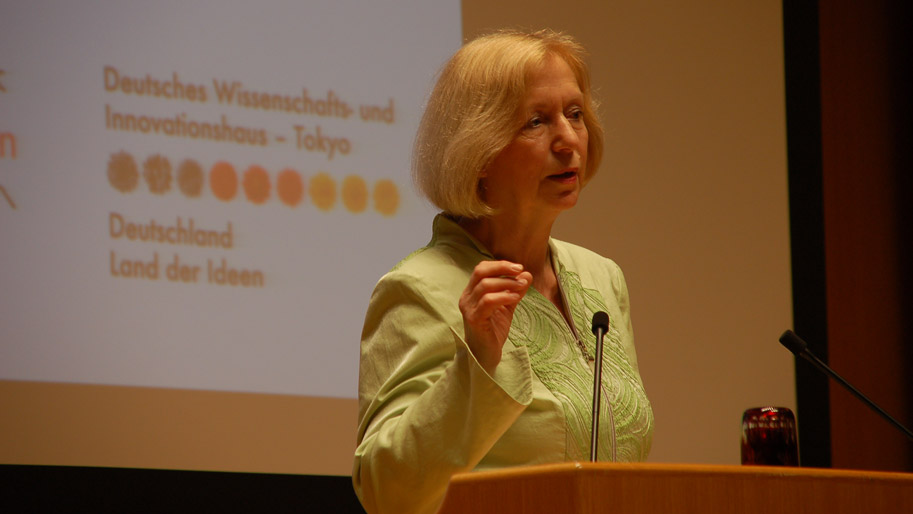Strategy aimed at the internationalization of science and research. Federal Minster for Education and Research Professor Johanna Wanka speaks at Keio University
 © DWIH Tokyo
© DWIH Tokyo
The Federal Minister for Education and Research Professor Johanna Wanka visited the Mita Campus of the Keio University in Tokyo on May 18, 2016. At Keio University Professor Wanka met with the president of the university, Professor Atsushi Seike, gave a speech on the “Internationalization of Science and Research in Germany”, which was followed by a Q&A session, and attended a poster session on German-Japanese cluster co-operations. The visit was jointly organized by the German Research and Innovation Forum Tokyo, the Keio University and the German Embassy in Tokyo.
Professor Wanka came to Japan to participate in the G7 Science and Technology Ministers’ summit in Tsukuba, which took place between May 15 and 17, 2016. Accordingly, the speech held by Professor Wanka in front of an audience of 120 or so people including university students and staff as well as representatives from politics and industry, provided an opportunity to discuss topics addressed prior by the G7 summit. The Federal Minister of Education and Research touched upon several issues, such as the fight against poverty-driven infectious diseases, plastic contamination in the ocean as well as women’s active inclusion and participation in science and research.
Regarding the federal government’s strategy aimed at the internationalization of science and research Professor Wanka stressed the potential and the mutual benefits to be gained through German-Japanese collaborations. Prominent examples of such include the digitalization of production processes as pursued within the context of Industry 4.0, in particular for SMEs, and next-generation battery research, which presents a critical factor for the successful transition from fossil-fuels to renewable energy sources. Collaboration between German and Japanese clusters, as demonstrated by a number of existing joint projects, has the potential to significantly contribute to the realization of the objectives towards these and similar endeavors are directed.
The following Q&A session provided an opportunity, particularly to the attending students, to address the Federal Minister of Education and Research directly. At the end of her visit at Keio University, Professor Wanks participated in a poster session dealing with German-Japanese cluster collaborations, which had been set up by the DWIH Tokyo in co-operation with the Yamagata University, the city of Saitama and the Bavarian representative office in Japan. In addition to providing insights into the joint projects on microelectronics (Yamagata/Yonezawa-Saxony) as well as mechatronics and automation (City Saitama-Bavaria), the presentation outlined the federal government’s strategy for the internationalization of clusters in Germany. These initiatives play a pivotal role in the wider context of the internationalization of science and research in Germany and present an opportunity to further deepen existing German-Japanese collaborations and create new German-Japanese projects.
